Protecting Borders
CDC responder Karlyn Beer (left) and local officials look across a river that acts as a border between Liberia and Cote d’Ivoire. The power lines show how electricity is generated in Cote d’Ivoire and carried across to Liberia.
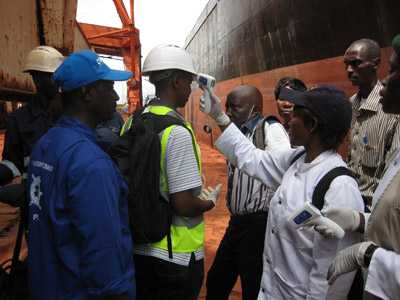
Health screening at the Conakry Maritime Port in Guinea.
A disease threat anywhere is a disease threat everywhere, and the Ebola epidemic has shown how easily infectious diseases can cross borders—land, rivers, and even oceans. From the start of the epidemic, porous country borders among the three West African countries and a highly mobile population aided the rapid spread of Ebola from its origin in Guinea. In West Africa, border control measures are mostly nonexistent—getting to another country is often as simple as taking a boat across a river. This makes it easy for a disease like Ebola to spread across countries and it complicates contact tracing.
In West Africa, CDC works with airlines, airports, ministries of health, and other partners to provide technical assistance for conducting exit screening and travel restriction in countries with Ebola. Exit screening helps to identify travelers who may have symptoms of Ebola, or who have been exposed to Ebola, to prevent them from leaving a country until it is confirmed they are not sick.
Once travelers land in the United States, more measures are in place to protect the public. CDC works closely with partners at major U.S. ports of entry to recognize signs of infectious disease in travelers. Since October 2014, CDC has been working with CBP to identify travelers who could have been exposed while in West Africa and conduct enhanced entry screening at five U.S. airports. CDC has similarly been working with the states, providing information and guidance, so that they can monitor these travelers once they arrive at their destinations. Screening and monitoring not only protects the health of these travelers, but also reduces the chances of them spreading Ebola to others.
To protect borders, CDC advises travelers about health threats, writes messages for airport message boards and signs, develops guidance for airlines and other partners, and trains customs agents and airport Emergency Medical Services personnel to identify symptoms of Ebola in travelers coming to the United States from countries with outbreaks. We also develop materials and training to screen travelers leaving countries with Ebola.
Stories from the Field
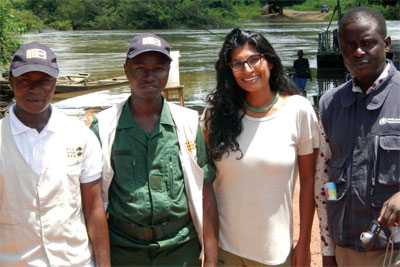
Rupa Narra (second from right), provides an infection control lesson to healthcare workers staffing a health inspection station at the border of Guinea.
Small boats regularly cross the river that divides the countries of Guinea and Sierra Leone, taking people back and forth across the border.
Along this river bank, CDC responder Rupa Narra taught infection control to Guinean medical workers who were screening boat passengers for symptoms of Ebola.
“They had two physicians, a nurse, and a couple other people working in a tiny health post made out of a tarp. The staff was really welcoming and happy to have the training.”
Before becoming an officer in CDC’s Epidemic Intelligence Service, Rupa worked for Doctors Without Borders (MSF). During her deployment, she struggled with not having a role in direct patient care, especially when Ebola patient admissions tripled at the MSF facility adjacent to her office during her 30-day trip.
“Seeing how stretched thin they were with human resources was the most devastating, helpless, heartbreaking feeling possible,” she said. But she found a way to help by educating MSF nurses about infection control. “It really opened up some new roles for us in the field and showed us some other needs that were different from surveillance and data entry.”
Rupa also spent time in Conakry, the capital of Guinea, working with their Ebola data system and on contact tracing activities. “Ebola was the talk of the town,” she said. “You couldn’t go through 10 minutes of your day without hearing local people speaking about Ebola and what is going on. Everyone’s lives have changed."
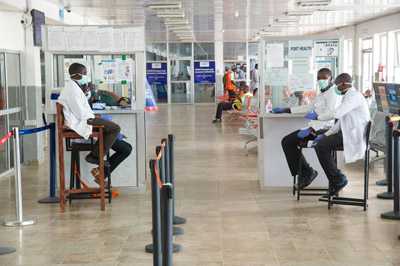
Health officials at the airport in Lungi, Sierra Leone.
When Blanche Collins arrived as the newest addition to CDC’s Border Health Team in Sierra Leone, she quickly dove in to help ensure that exit screening was being performed properly at Lungi International Airport. Since August 2014, CDC staff have partnered with airports, airlines, and others to help with exit screening and border health issues in countries with Ebola outbreaks. The screening—which includes temperature checks and looking closely for signs of illness—is designed to reduce spread of Ebola by preventing people who have symptoms or exposures from traveling.
Blanche helped the Lungi airport team check and evaluate travelers leaving Sierra Leone. During a typical day at the airport, she would check health declaration forms or ensure the quality of standard operations, such as checking temperatures or providing chlorinated water for hand washing. Then at night, she would watch exit screening of passengers before their flight departed.
She also had a chance to see the country, traveling to border crossings between Sierra Leone and Guinea to train CDC partners. She taught them how to use noncontact thermometers for screening arriving travelers and how to put on and take off personal protective equipment. Her duties took her to seaports as well, leading training sessions.
Blanche said that her month in Sierra Leone was one of the best experiences of her career. “The moment we became involved in this response, I knew I wanted to go to West Africa to contribute.” And after she came home, she knew she wanted to go back.
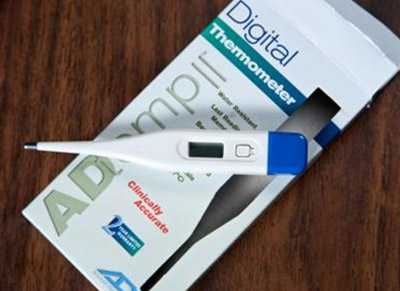
A digital thermometer is included in the Ebola CARE Kit for travelers to monitor themselves for fever.
Karen Wong, a CDC medical officer, deployed to Liberia in 2014 to work in the Monrovia Medical Unit for two months.
“Since I treated patients with Ebola, I was required to do direct active monitoring for 21 days when I returned to the U.S.,” said Karen. “When I returned, staff at the airport took my temperature, asked questions about my exposure to Ebola and symptoms, and provided me with a CARE (Check and Report Ebola) Kit.”
The CARE Kit contains information about Ebola, tools to check and track temperature and symptoms for 21 days, and information on whom to contact.
Direct active monitoring requires a public health worker to observe Ebola response workers at least once every day to see if they have a fever or other symptoms. This direct active monitoring can be done in-person or via video chat for 21 days. “A colleague of mine, who is a public health worker, was responsible for observing me. Sometimes we met in-person, but other times I took my temperature while I video chatted with her,” said Karen. “It was very easy to do and important for keeping everyone safe.”
“Although I had gotten a flu shot earlier, taking my temperature every day and seeing a normal reading was reassuring,” said Karen. The flu has some symptoms similar to those of Ebola, and if Karen had any flu symptoms, she would have needed a medical evaluation and possibly Ebola testing. She was relieved when she was confirmed Ebola-free at the end of 21 days. “I went out with friends to celebrate completing my monitoring—it was a good day.”
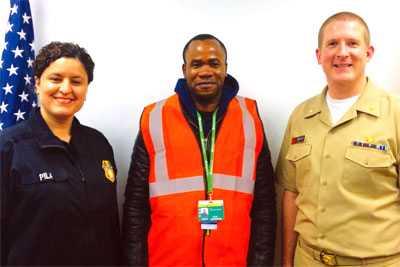
CBP officer Pila and Chicago Quarantine Station officer Derek Sakris with traveler David Johnson.
Derek Sakris was working at Chicago’s O’Hare International Airport in late 2014 when an officer from Customs and Border Protection (CBP) told him that a traveler who had been screened the previous day was back and needed assistance. The traveler was David Johnson, a native of Liberia and now a U.S. citizen who had just returned to the United States from West Africa. He had been searching for family members who were separated in wartime. His hopes were realized when he located his brothers and sisters in Sierra Leone.
David returned penniless, only to find that his landlord had moved his belongings out of his rented apartment. Friends refused to house him because they feared he might have Ebola. He hadn’t eaten for two days. With nowhere else to turn, David spent the night at the airport.
When Derek heard about the stranded traveler’s plight, he mobilized resources. He contacted partner agencies to secure life necessities for David. CBP officers bought him food and the Chicago Department of Public Health and American Red Cross provided lodging and meal vouchers for David during his 21-day active monitoring period.
To provide for his long-term needs, CBP enlisted Travelers Aid Chicago. The social service program helps travelers in crisis, offering social and emotional support. A case manager helped David find a job and long-term housing.
“In public health work, it is rare that you get to observe someone getting immediate help like this. You don’t always witness the impact of your help, but this was one of those nice occurrences,” Derek said.
How CDC is Protecting our Borders
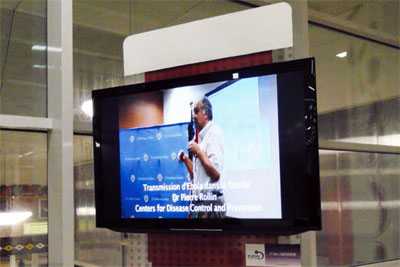
Ebola information in the Conakry, Guinea airport. This video features CDC Ebola expert, Dr. Pierre Rollin.
Exit Screening in West Africa
CDC works with airlines, airports, ministries of health, and other partners in West Africa to provide assistance for conducting exit screening and travel restriction in countries with Ebola transmission. Exit screening efforts in West Africa help identify travelers who may have symptoms consistent with Ebola or who have been exposed to Ebola, to prevent them from leaving a country until it is confirmed that they are not sick with Ebola and are therefore not at risk of spreading Ebola. CDC believes that screening outbound passengers in West Africa is one of the most highly effective measures for preventing the spread of Ebola.
Entry Screening in the United States
All air travelers entering the United States who have been in Guinea, Liberia, or Sierra Leone are being routed through five U.S. airports (New York’s JFK International, Washington-Dulles, Newark, Chicago-O’Hare, and Atlanta) for entry screening.
Entry screening helps to prevent further spread of Ebola and protect the health of all Americans by identifying travelers who may be sick with Ebola or may have had an exposure to Ebola and by ensuring that these travelers are directed to appropriate care.
These inbound travelers receive Check and Report Ebola (CARE) Kits that contain further information about Ebola. This kit includes information about Ebola, tools to help travelers check their temperature and symptoms each day for 21 days, and information about who to call if they have symptoms.
Active Monitoring
The purpose of active monitoring is to ensure that a person’s health is closely followed by public health authorities so that, if symptoms develop, action can be taken immediately to isolate the person from others and arrange for medical evaluation. People who have been in a country with widespread transmission are actively monitored.
Active monitoring means that the state or local public health authority checks daily with the traveler to see if he or she has symptoms and fever. The traveler reports daily on temperature and symptoms consistent with Ebola (including severe headache, fatigue, muscle pain, weakness, diarrhea, vomiting, abdominal pain, or unexplained bleeding).
Screening by the Numbers
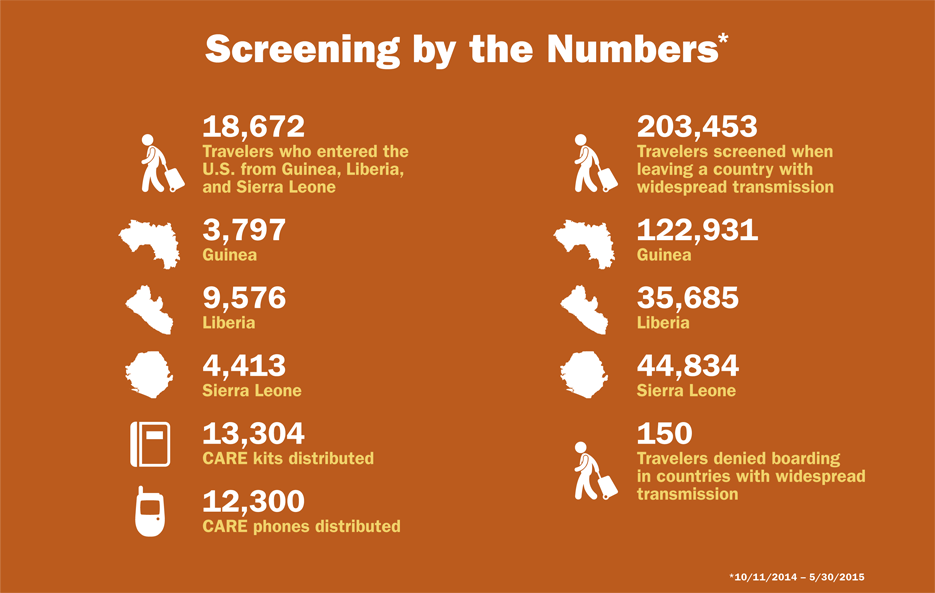
- Page last reviewed: July 9, 2015
- Page last updated: July 9, 2015
- Content source:


 ShareCompartir
ShareCompartir